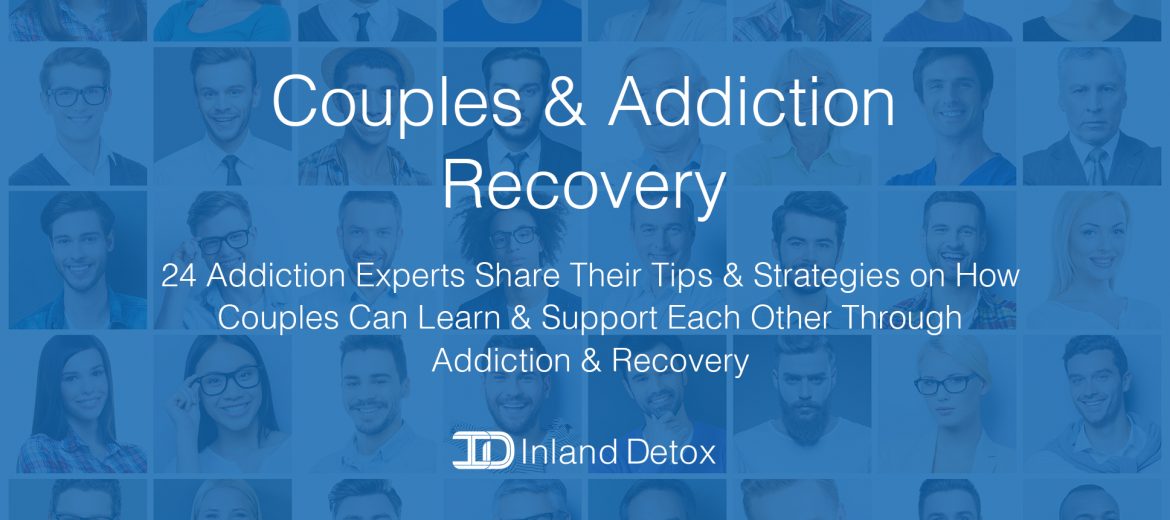Addiction is often referred to as a family disease, but current approaches in recovery programs typically do not include relationship and conflict management or how-to navigate through recovery and heal from the aftermath of addiction.
So we asked our top 24 addiction experts and mental health therapists in San Diego, California to share their insight on how couples can learn and support each other through addiction and recovery.
Whether you’re looking help for yourself or someone you know, there’ll be something here for you.
See what the experts said.
Couples & Addiction
24 Addiction Experts Share Their Tips & Strategies on How Couples Can Learn & Support Each Other Through Addiction & Recovery
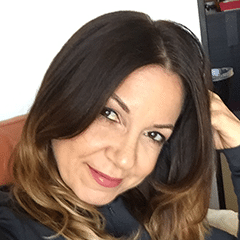
Lisa Bahar
MA, CCJP, LMFT, LPCC
https://www.lisabahar.com

Shelby Castile
M.A., RYT, LMFT
https://www.shelbycastile.com/
Couples & Addiction
There is a special feeling of isolation and helplessness that creeps up when a loved one is addicted. It is easy to feel isolated from your loved one if they’re addicted. You may start to feel helpless when faced with something as large as substance addiction, especially in a partner. Even in these difficult times, there is hope for you and your partner. Facing an uphill battle, what can you do to help and support your loved one during this time of need?
Talk About It
Talking sounds so simple, doesn’t it? But when it comes to talking to our partner or spouse about their addiction, we clam up and avoid it like the plague.
Talk to your partner and let them know that they are loved. Tell them, in a non-confrontational way, how their addiction affects you. Your partner doesn’t need to hit “rock bottom” before you talk with him or her about their addiction. If you worry that they’re addicted, don’t wait. Talk to them.
Establish Boundaries
Creating boundaries with your addicted partner sets ground rules about what you will and will not tolerate. Not only does this give clear guidance as to what is acceptable to you in your lovers’ eyes, but it also addresses the fact that you may have been enabling the addictive behavior without knowing it.
Clear boundaries act as goals and direction for both you and your spouse. If a boundary is violated, you need to be firm in your resolve and the consequences that come from such a violation. Enforcing the consequences is one of the most difficult things you can do but not enforcing them destroys your credibility and re-enables your partner.
No matter what, the actions you take when your partner is addicted show that you love them and care about them.

While addressing your injuries as a couple, keeping a strong focus on your personal continuing recovery is critical. When we attend to ourselves and get the support we need, we bring to our partnership a person ready to engage. In addition, counselors and 12-step group members give you opportunities to learn about and experience healthy relationships like the one you want to have together.
As you and your partner’s individual recovery progresses, couples therapy can be added to support the process of attending to your relationship. Effective communication techniques, setting boundaries, and successful conflict resolution skills are building blocks of satisfying relationships, and yet most people have never seen them modeled. Growth in your ability to talk and to resolve issues in turn leads the way to new corrective experiences.
Therapy can also help you tend to the injuries, resentments, and broken trust. Both parties need an understanding of the other person’s underlying experiences that led them to behave in the ways that were so hurtful.
You and your partner can uncover what you both learned to do to survive, how you were likely protecting yourself from pain, at times harming each other in service to that, and begin the process of learning different ways to take care of yourself and still show up for your partner’s needs.
With authentic understanding of each other, empathy sprouts and grows. And with understanding and empathy and new tools for handling things differently, new experiences begin healing the wounds of the past. Authentic and lasting forgiveness becomes a real possibility.

Todd Creager
MSW, LCSW, LMFT
https://toddcreager.com
One way of looking at addiction is that it is a way to regulate one’s emotions. People use substances like cocaine to up regulate themselves (meaning to give them energy) and use substances such as marijuana typically to down regulate themselves (meaning to calm then down from hyperarousal). Often when I work with couples I teach them that they have to make it their job to regulate themselves and each other. Couples often do this automatically when in the courting phase but they settle in and often get in a rut after a while.
While one or both partners are going through recovery from addiction, it is especially important for each partner to see themselves as up and down regulators of the other person. For example, one of the best down-regulating activities is being a good listener. Attuning to the other person has a calming, anti-inflammatory effect on the person who is being heard. For the person in recovery, it is easier to stay on the sober path when he or she is feeling calmer and supported. Likewise, the partner of the addict can be more supportive when he or she feels listened to and supported as well. I recommend for couples to spend 10 minutes (minimum) a day slowing down together. During these 10 minutes they can talk about things that really matter or have slow gentle touch. This can be calming and down regulating.
Likewise, up regulating involves lifting one’s partner from a neutral state to a more joyful one. For example, if a spouse comes home and gives a big smile and says something that he or she appreciates about the other, that other person will be lifted. Practicing these skills makes it easier for both the person in recovery and the partner.
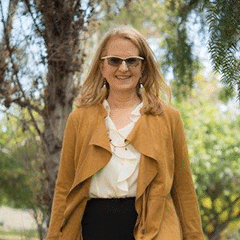
Sheryl Woodhouse
LMFT
https://borntobebalanced.com
Couples can learn and support one another in healing from addiction by recognizing first and foremost that the addicted person alone can only travel the road to sobriety. No nagging, threatening or punishing behavior will help the addicted individual get well or somehow “snap” out of their addiction. The partner of the addicted person can calmly, lovingly and firmly provide emotional support by offering treatment resources such as a treatment center, 12-step meeting, website, therapy group or Church group such as Celebrate Recovery and then let go of the outcome. The partner needs to allow the addicted person to be responsible for his or her own actions and decisions and the partner be responsible for his or her own actions and decisions. Both parties need to seek out treatment for their individual illness and stop allowing the addicted individual’s behavior to dictate the emotions and mood of the relationship. Recovery can be achieved by stopping the vicious cycle of accepting unacceptable behavior in a loving and peaceful manner by detachment, boundary setting and focus on self-responsibility. When the partner of an addicted person stops narrating the dynamics of the relationship and begins living recovery behaviors, the greatest impact will be made on healing the relationship one way or another.

LMFT
Addiction is one of the most difficult situations a couple can go through, whether one party struggles with addiction or both of you are trying to get clean together. In either scenario, one of the most important things you can do is just listen. That may sound basic, but the recovery process is a long one and can contain many opportunities to grow together by learning from each other’s journey. How has addiction impacted each of you individually and as a couple? What are your individual dreams for the future and your collective dreams as a couple? All of these issues can only be addressed through communication and respectful listening.
Clearly defined boundaries are also vital to healing a relationship during the recovery process. But, once again, communication is key! Boundaries are only as effective as how well you communicate them. With boundaries, it is equally important to be both firm and compassionate – your commitment to not enabling substance use, for example, should be consistent but don’t forget the place of love that it comes from!
Traveling the path of recovery as a couple might not be easy, but it can also be a journey of healing that can bring you closer together. Accept each other, love each other, and support each other. Above all, listen to your partner’s struggles and growth – and be willing to share your own!
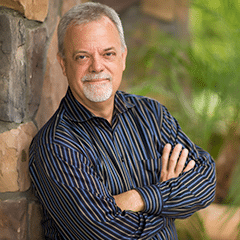
Charles Andrews
M.A., LMFT
https://andrewstherapy.squarespace.com
Intimate relationships are tough enough sometimes without the added difficulty of substance use by one or both members of the couple. Problems of closeness and distance, already pronounced in couples who are having emotional difficulties with each other, are usually transformed into problems of crisis-proportions when substance use is also occurring. Substances take us further away from our partner. It’s inevitable. Except, perhaps, in rare cases not relevant here. Nearly always, using a substance will remove me from my partner, and put me in my own world, where my partner isn’t all that important, except, perhaps, as someone I can exploit or manipulate in some way to get whatever it is I want when I’m using or want to use.
I may even think I love them. But as a matter of brain function if nothing else, it is generally impossible to engage in a mature love-relationship while in active addiction.
So, if I want to maintain my substance habit, and I want to have a healthy, growing intimate relationship at the same time, I am trying to combine two very different experiences that do not reinforce each other in any positive way.
They will reinforce each other in ways that create vast amounts of misery however.
This is one of the many very good reasons why most treatments for recovery from substance-use include a recommendation prohibiting any serious intimate relationship for at least a year while clients remain in early sobriety and work on themselves, on their own growth and awareness. If it’s difficult to have an intimate relationship of any real value while actively using, it is, in some ways, even more difficult to have one in early sobriety. Because the inevitable pressures of attempting to cultivate an intimate relationship while simultaneously learning how to remain substance-free–and moreover, simply learning how to live life as a sober person—can be enough pressure to sabotage the entire project of sobriety and thus often lead straight back to substance-use.
And, sometimes, if I am in an intimate relationship at the beginning of recovery, I may find, as my partner may find, that when I’m sober, the relationship makes no sense. My partner may have been attracted to me because I was using—this happens quite a lot, sadly—a caretaking partner coupled with a substance user is the kind of tightly fitting, highly-dysfunctional relationship that is difficult to alter, difficult to get out of, and when the substance user finally gets sober the caretaker suddenly has the feeling that she/he has nothing to do. This can cause many problems and is very, very common.
This is all fairly settled clinical experience. More practically, how can a couple come back from destructive substance-use by one or both people?
It can be done. But this kind of evolution and healing requires a great deal of commitment to work: work on self, work on understanding my partner, work to leave behind the seductive world of substance-use and live as a sober person. And work to realize that sober life, for one or both partners, is a very different experience from the using life.
I have found that I don’t work very differently with couples who are using substances. The substance use becomes one more part of the relationship. Sometimes—often—it becomes an outsized part. A mentor of mine, a brilliantly skilled family therapist with decades of experience once commented that “when a family or couple comes to me and one of them says ‘I have a drug problem’ I have occasionally said to them ‘well, now you have a big shiny, gaudy problem to deal with and you don’t really have to work on all the other problems in your relationship, right?’” She noted that substance-use can become an enormous emotional and physical drain, sucking away the energy required to deal with any number of other problems in the relationship that are also probably quite serious. From this view, substance-use becomes a form of defense against having to face and work through other pressing emotional difficulties in both the individual who is using, their partner, and between the two of them. I have seen this particular relationship-system many times, and it does make the work of healing more difficult and complicated—but not impossible.
In the end, the right couples’ therapist, who knows what they are doing, can help even couples suffering from the misery of addiction in one or both of them to heal themselves and their relationship. A therapist of this kind can certainly help, but, ultimately the most basic requirement is full commitment to both sobriety and the healing process. If both members of a couple make that commitment and are serious about it, nothing is impossible.

Ipek Aykol
LMFT
https://www.ipekaykol.com
Couples and Addiction
Communication and relationships are two of the most important areas of our lives. When an individual is struggling with addiction, these two areas are highly impacted. In the case of a partner who uses drugs or drinks too much, the greatest price is often paid by the abuser’s partner aside from the abuser.
Supporting vs. Enabling
It is important to understand the difference between supporting and enabling. Partners who make excuses for harmful, abusive, dangerous behavior may be sending the message that they are complacent with their partner’s addiction. Giving money, making empathy threats, covering up their problems fall under enabling. By stepping in to correct their addicted partner’s mistakes, partners actually take away any motivation for the addict to take responsibility for their own actions. Hitting rock bottom is the most important thing preceding an alcoholic or addict’s decision to seek treatment. When people enable their partners, they prevent them from hitting their rock bottom and prolong their usage.
Communication
If one partner is struggling with addiction, the other one needs to avoid engaging with them when they are under the influence as their message will not be received due to their impairment. It is important not to be judgmental and critical as the conversation may become a fight if the individual feels attacked or criticized. The key is to remain calm during the conversation and focus on one’s own feelings: “I felt hurt when you yelled at me last night” or “I felt scared when I saw you blackout on dinner table yesterday”. It is very important for the partner to seek out support groups to receive help and guidance.
Needs
If one partner is in recovery, it is important to know that they need the support of their partner more than anything. It is important for the partners to communicate their needs with each other in addition to educating themselves. The partner in recovery may need some time to explore who they are without drugs or alcohol, they may also need time to fulfill family responsibilities. Anger is often built up after years of dealing with the partner’s addiction. Holding on to anger may prevent you from healing and moving forward; therefore therapy may help you process these feelings to move forward.

Sarah Callow-St. George
MA, LPCC
http://www.scsprofessionalcounseling.com
Lies. Secrets, Resentment. These are issues you may be familiar with if addiction affects your relationship. Whether your partner is an addict, or you’re dealing with a substance abuse problem yourself, addiction can be one of the most challenging situations for a couple to endure. Exploring your role in your relationship and finding the courage to be honest with yourself and your loved one may prove to be difficult, but will allow for more support and understanding for both partners.
When dealing with addiction, it is often tempting to point the finger at the other person; however, taking personal responsibility for how we may be participating in the cycle of addiction is crucial. Codependent behaviors are often engaged in without one being fully conscious that they are in fact participating. Individual therapy is an effective way to identify codependent behaviors and gain insight into what is driving our participation in the cycle of addiction. When addiction dampens a couple’s ability to experience happiness, contentment, and even safety in a relationship, establishing and respecting personal boundaries is essential. A recovery program inclusive of individual and/or couples therapy and support groups such as AA, Al Anon, and ACA (Adult Children of Alcoholics) can foster self-discovery and enhance your ability to make personal changes to positively impact your relationship, and ultimately your well-being. Utilizing these tools to establish healthy boundaries, limit codependent behavior, and practice effective communication is likely to lead to a more supportive and fulfilling relationship with your loved one.

Sibylle Georgianna
Ph.D., CST, CSAT, CCPS, EMDR Certified
When a certain situation triggers a relationship a crisis and all the pain and chaos that comes with that, we understandably want to stop the pain as quickly as possible. In a crisis, our human body is designed to go into “survival” mode, not into complex decision making. We are going into “fight and flight”, not “ponder and wonder”. The impact of someone else’s chaos can create negative health outcomes in yourself. You may or may not feel anxious or depressed by your loved one’s issues but may notice that you cannot sleep, overeat, or cannot seem to get to the gym. Not to mention that you feel you are the first catching whatever sickness goes around in the office. Research shows that people’s immune system is taxed if they are dealing with a crisis. In addition, because our body is busy with survival, the brain focuses on survival and not on complex decision making. In other words, in addition to dealing with the crisis, you may be affected by difficulties to concentrate, problem solve, and plan strategically what is best for you long-term.
In other words: as you may deal with
(a) the crisis + (b) a stress response + (c) an impaired ability to make the best decisions that are in line with who you truly are = you have a lot going on.
In these times, it is especially important to take good care of yourself: to empower yourself that you get to be your true best self despite of what you are dealing with. Here are some healthy things to engage in when in a relationship crisis:
(a) Healthy Attention To Restore Your Health And Problem Solving Will Start Moving You Out Of Crisis Mode Into Healing Mode
Even if the crisis may have been prompted by your significant other and it feels that you need to spend all of your resources on moving the person out of his/her chaos so that your crisis decreases, decreasing your stress response gets to be your first and most important task in this season: this will unleash you to come to the best decision that this complex situation requires. As it may feel impossible to do so, try one tool at a time, e.g., how to slow down and get some rest (if sleeping feels impossible), assertiveness strategies for healthy communication, or and stress relief activities such as relaxation resources.
(b) Find Healthy Support In This Complex Situation:
You will not need to master this on your own! Instead of needing to figure out if family members can be trusted or will worsen the crisis with their responses to what is going on, look for a specialized counselor who assesses for the complexity of you are dealing with: Is the counselor/therapist assessing you/your significant other’s stress response? Is the counselor/therapist trained in assessing for addiction? Is he/she trained to be sensitive to your specific circumstances such as your cultural background, religious values? Are they taking a directive approach (“You should….” “You should not…”) or an approach that will allow you to make your best decisions at a pace you feel comfortable with? While the temptation can be to get in with a counselor right away instead of “interviewing” several counselors for your best fit, the truth is that a not-as-trained counselor may create a so called “medical or treatment induced” trauma due to a lack of information on the complexity of the issue.
(c) To Do: Equip Yourself For BEST Decision Making
Allow yourself the time to develop a roadmap for direction consequences in response to your loved one’s behaviors. A lot of counselors recommend to not make major decisions (e.g., change jobs, sell the house, divorce) within 4-6 months of a crisis. Instead, use that time to engage in reducing the stress response and use guided support to make sense of what happened.
Even if it feels counterintuitive to make a list of losses and casualties that come with a crisis, research shows that a couple affected by crisis can only generate hope if one first makes a list of the losses that occurred, grieve the dreams that were shattered, and fully acknowledge the damage that was done. Once there is ownership of the crisis, the couple will be able to start their healing process. Look for a professional who is trained to lead you through grieving, disclosures of problematic/secretive behaviors and betrayal trauma that may have led to or resulted from the crisis. For example, look for Clinical Specialists of Partner Trauma or a Certified Sex Addiction Therapist who offer “disclosure” workshops, intensives, or other structured ways to systematically guide a couple from crisis to healing. As paradoxically as it may seem, a guided dialogue promotes the ability to move from grievance to hope and the ability to cast a new vision and to truly re-romanticize and rebuild their relationship, if they desire.
To Summarize:
Even if it may feel like the last thing possible, there is a way out of crisis mode into hope and healing. May you feel empowered to pursue this path as you are worth it!
Melissa Berschauer
M.A., LMFT
http://melissaberschauer.com/
When one part of a couple is struggling with addiction, the other part of the couple is struggling with the effects of addiction. Both parties are struggling, but in different ways. Unfortunately, this can lead to couples becoming disconnected, primarily focused on their own pain and frustration.
Fortunately, there are ways to turn this pattern around and learn how to reconnect. This is accomplished by improving several key elements of the relationship: Communication and empathy; boundaries and trust; and emotional healing.
In this situation, communication is not about talking, but instead it is about learning how to listen. By taking a non-judgmental stance and becoming truly engaged in learning about the other person’s struggles, fears, and weaknesses, empathy can be enhanced. One way to practice this improved communication skill is by asking questions about your partner’s inner struggles in a calm and supportive tone. The goal is to learn something new about your partner that you had not considered.
Boundaries are important in every relationship, but are especially important for couples recovering from the effects of addiction. It is essential to get in touch with your own sense of self. For example, ask yourself, “What do I stand for,” and equally as important is the question, “What won’t I stand for?” Be specific, communicate with each other, and spell it out so there is nothing left to question. Having firm boundaries in place allows trust improvement that is measureable to both parties. When trust is improved, the relationship is improved.
When it comes to emotional healing, remembering to have fun together is key. A healthy dose of laugher, spending time together doing new things, or revisiting something that you used to enjoy as a couple, can all be ways of upping the fun factor. Even when there has been a lot of damage, having fun together as you rebuild can go a long way towards overall couple improvement.
Janira Jacoubs
Licensed Clinical
Psychologist, Psy.D.
https://www.anaheimhillspsychology.com/
Many couples find that deep wounds from the past continue to impact the health of their relationships. This is particularly true when one spouse has struggled with addiction. How do you move past the hurtful things that were said or done? Is there hope for relationships bruised from the effects of addiction?
The answer is, yes! It is not an easy process, but with some tips on communication, validation, and appropriate boundaries you can find happiness in your relationships again.
The first step in healing from a damaged relationship is learning how to communicate and validate your spouse. I often see how poor communication leads to marital conflict in my own practice. “She doesn’t respect me… He never makes me feel valued…” and the list goes on.
Validation makes the world of difference. This refers to making one’s point of view and emotions feel valid and understood. Couples often fail to validate each other and instead resort to problem-solving. When your partner talks to you about a problem or issue at hand be present, listen, reflect, and validate his/her point of view.
For example: “Honey, I had the worst day ever! A coworker got upset with me about an error that I made and I got defensive. The worst part was that all happened in front of customers.”
Invalidating Response: “Haven’t I told you that you should really pay more attention while you are at work? It doesn’t help that you check your Facebook page every half hour. Maybe you should learn better customer service skills to avoid conflict with your coworkers in the future.”
Validating Response: “I am so sorry you had a bad day. It sounds like your coworker made you feel disrespected and humiliated you in front of others. No one likes to feel that way.”
When you are able to validate your partner’s emotional experience rather than trying to “problem-solve,” effective communication occurs. Couples tend to feel “close” and “understood.”
Another tip to improving relationships involves establishing boundaries. Boundaries should not be mistaken for rules. Boundaries merely keep you engaged, accountable, and involved in the success of your relationship. When one partner has struggled with addiction boundaries are even more significant. This is done by creating standards in your relationship. If you give 100% to your relationship then expect 100% in return. This doesn’t mean a call to perfect, rather an unyielding commitment to have a healthy relationship. Remember, you can’t have a happy marriage or partnership if you are carrying the responsibility for happiness and success all on your shoulders. Even if your partner has struggled with addiction in the past, you must sustain expectations for them to meet in your relationships. Addiction should never become a reason for you to require less than 100% commitment, honesty, and effort to maintaining a healthy relationship. Expect more… This is actually validating to your partner. They know that you think highly of them when you require an equal level of engagement and responsibility in the relationship.
In summary, healing from the impact of addiction and recovery is possible… It will just take time, effort, and changes to the way you engage with your partner.
Susan Pazak
PhD
https://www.askdrsusanp.com/
Healing individually in recovery is often stressed as the primary focus, learning to navigate a relationship with a significant other can be challenging. New rules, roles, limits and boundaries need to be set. As the relationship with self changes and improves, new ways of interacting need to be explored.
Identify your needs from a mate
I often hear in session “he or she “should” know my needs or wants”. A person only knows what we want by asking, hence scripture states “we do not have if we do not ask” referring to God, I believe that applies to our interactions with others as well. Think about your wants from your relationship and write those desires to discuss your expectations. In recovery, this is a great opportunity to create the relationship you want.
Set rules of engagement
Basic rules of engagement need to be set. For example, no name calling, no cursing, no character assignation, effective conflict resolution skills, or problematic patterns of interacting in the past. Love always trusts and always respects. We can’t trust what we don’t respect and we can’t respect what we don’t trust. Teach your partner how you want to be treated.
Take a Daily Inventory
Personal daily inventory is recommended in recovery. It helps to be aware of successes and shortcomings, being more present, mindful and aware. Living one day at a time creates a satisfying life in recovery as well as relationships. I recommend that couples do this exercise as well. It helps to identify the positive changes as well as identify hurts that can turn into resentments if not addressed, worked through, forgiven and let go.
These tools can help in healing a relationship challenged by addiction in the past and being successful moving forward.

Tara Myers
MS, LPCC – DBT-Linehan Board of Certification, Certified Clinician™
https://www.centerforebt.com/
Addiction not only destroys the life of those who are addicted, but also negatively impacts their family. This is especially true of significant others. Some spend a great deal of time cleaning up their mess and trying to keep up appearances. Others walk on eggshells hoping for the best. No matter what, they need help even if the person who is addicted does not want help. A therapist who has experience with addiction and the family can help him or her develop healthy boundaries, as well as learning how to help the person get into treatment. If the person with the addiction were on the fence, it would be helpful for him or her to find a therapist or treatment program who specializes in motivational interviewing, which can help motivate towards change and to obtain a commitment to treatment. Treatment should include individual therapy, as well as couples treatment, when the person has committed to recovery. When researching treatment options, look for a program that includes a family component.
Leonard Wayne
USC/MSW
https://leonardwayne.com/
A strong loving relationship with a partner can be an immensely rewarding experience, providing a companion through good times and bad.
However, despite the benefits, no real relationship is perfect. If your partner is struggling with an addiction to drugs or alcohol, you feel as though everything is crumbling around you. It may seem as if God has turned his back on you or your spouse, or that some mistake you made led to this change in behavior.
You may even believe your loving relationship is coming to an end or that you’re powerless to make a difference.
Consistency, honesty, and spirituality are at the foundation of positive loving relationship, and an addiction to drugs or alcohol can threaten everything you hold dear.
Luckily, there’s no need to forge ahead alone. leonardwayne.com is here for you and your loved ones.
In areas of addiction—perhaps an excessive attachment to food, or to work or sex, we lose some measure of choice. Our behavior becomes compulsive, and this is important to understand. When our attachments to anything other than God become strong enough, we lose some element of initiative and will. As they say in treatment programs, “It’s your drug talking.”
Let me offer a few guidelines to determine the extent of the problem, and then some suggestions for intervention. What are the hallmarks of addiction—and by the way, the addict is the last person you want to ask to determine if they are addicted, for obvious reasons.
First, an addiction is a mood-altering substance or activity, used to create positive feelings. Some common addictions are to drugs, alcohol, food, sex, shopping, work, gambling, religion, television, the Internet. You can see how these activities alter the mood, and thereby become self-reinforcing.
Second, the use of these substances or activities is progressive. The addiction may start out with a small amount, but gradually increases, taking up more time and energy. Thoughts about the addictive substance or activity become obsessive. Cravings increase.
Third, this substance or activity has a detrimental impact on either the addict, or the addict’s family. As the addiction takes over more and more of the addict’s life, freedom and choice gradually recede and compulsive behaviors increase. In spite of the negative consequences, the addict seeks the “high” of the substance or activity. Family life deteriorates. Job performance declines. Spiritual integrity is compromised. Health is often impacted.
Fourth, the addict minimizes the negative impact of their behavior on themselves and others. When confronted, they inevitably will deny the harmful effects of their activities or substance use, in spite of family protests to the contrary.
Fifth, behaviors become focused on the addiction. The alcoholic must know where they will get their next bottle. The drug addict knows where they will score their next hit. The pornography addict knows when they will be alone so they can view pornography. Life becomes wrapped around feeding their addiction. Today there are even those who must know when they will get online to respond to their next email.
Finally, without intervention, addiction leads to spiritual, emotional and perhaps even physical death. In spite of negative consequences, owing to denial, the addict cannot “see” what they are doing. Even as life collapses around them, they maintain steadfast denial about the excruciating consequences of their actions. This speaks to the power of addiction.
Given the addict’s profound denial, in spite of mounting evidence that their life is unmanageable, what can those around the addict do to help the situation?
Most important, you must stop enabling the destructive process to continue. It will do no good to “just keep carrying on the best I can.” Seeking professional help and support, consider all the ways you may be unintentionally tolerating the addictive process to continue.
Anytime someone needs help but refuses to accept it, which is the case with your husband, an intervention is appropriate.
Remember, any action must be bathed in prayer . It will take courage to stop the insanity. You, and those who love the addict, must be strong and courageous, knowing that God doesn’t want them in bondage.
Consider these scriptures: “The Spirit of the Sovereign Lord is on me, because the Lord has anointed me to preach good news to the poor. He has sent me to bind up the brokenhearted, to proclaim freedom for the captives and release from darkness for the prisoners.” (Isaiah 61: 1) But, this is done through the power of God.
“O LORD, God of our fathers, are you not the God who is in heaven? You rule over all the kingdoms of the nations. Power and might are in your hand, and no one can withstand you….If calamity comes upon us, whether the sword of judgment, or plague or famine, we will stand in your presence before this temple that bears your Name and will cry out to you in our distress, and you will hear us and save us.” (II Chronicles 20: 6-8)
Finally, you will need strength throughout the recovery process. Starting into a recovery group, such as the Christian-based, Celebrate Recovery, is only the first step. There will be counseling, meetings and aftercare.
Relapse, sadly, is often part of the journey toward wholeness and healing. Learning new ways of thinking and behaving, are a life-long process as you both grapple with acceptance of the gravity of the problem, and surrender to the power of Christ in your lives.
Taking the first step is most important.
“I am the vine; you are the branches. If a man remains in me and I in him, he will bear much fruit; apart from me you can do nothing.” (John 15:5)

MA, LMFT, EMDR
With couples and addiction, we have to take a look at the relationship dynamics to better understand the unhealthy behaviors, boundaries, and communications that are happening in a couple’s relationship. On many accounts, there are inherent codependent and enmeshed dynamics happening between a couple and their interactions. The codependent and enmeshed behaviors become corroborated with substance use and addiction to facilitate detrimental pain, suffering, and resentments between one another. What is codependency and enmeshment? Codependency is when an individual’s choices, actions, and behaviors, stemming from an emotional and psychological perspective are excessively influenced by the other in an unhealthy way. Being excessively influenced by another can look like the behaviors of control and manipulation. Enmeshment in a relationship is where there is a loss of personal boundaries to one’s detriment that leads to the loss of one’s autonomous or independent development. Codependent and enmeshed relationships within couples can be challenging enough to navigate into healthier territory, and when addiction also comes into play many things become affected quickly and the situation can turn dire fast. Hence, the benefits of having the individual(s) dealing with addiction to go into a treatment program in order to learn new tools, finding healthier ways of communicating, and setting healthy boundaries to facilitate a healthy change within the relationship system. This doesn’t mean that the other partner who may not have an addiction gets to blame the individual with the addiction, calling them out as the Identified Patient (IP). This is where the rubber meets the road and both individuals in the relationship acknowledge their own part and the roles they play in the relationship that has facilitated such an unhealthy response to living life together. It takes two to dance, and it also takes two individuals to take responsibility for their choices, actions, and behaviors to engage in the opportunity for positive, healthy change.

Karen Rippy
Ph.D., LMFT
https://www.karenrippy.com
Despite the fact that every major medical and scientific organization in the nation asserts that addiction is a chronic disease, couples (and their families and friends) continue to view addiction as a moral failing. They do not take into account that severe addictions by their very nature lead to lying, covering-up, lack of connection and unpredictable moodiness. Secrets underlie all addictions and transparency is an important key to deep emotional connection. Marriages in which one or both partners abuse drugs or alcohol are four to seven times more likely to end in separation. It is essential to find programs and licensed family therapists who are well-trained in addictions, individual, couple and family therapy. The American Association for Marriage and Family says it this way: “Substance use causes conflict, the conflict leads to more substance use as a way of reducing tension, conflict about the substance use escalates, more drinking or drug use occurs, and so on.” I am Family therapist working in both private practice and Couples-Friendly Rehab. An important goal to assist couples restore their relationships back to help is to identify sober support systems and guide treatment, both individually and with marriage-friendly couples counseling or Discernment Therapy to develop time-limited structure.
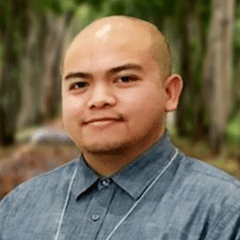
Jan Alfred “Alfie” B. Valdes
MA, LMFT
https://alfievaldes.com
Addiction can be extremely difficult for couples. Couples often struggle to find meaning in the addiction and have difficulty containing it. Couples may feel powerless, out of control, hopeless, contemplate breakup or divorce, and feeling like there’s nothing else they can do. One of the best ways to solve this powerlessness in couples is to give the addiction a name. For example: Larry and Christine were happily married for 2 years until Carl (the addiction) got in the way. The name can be simple and practical or creative and complex. Other examples include: Alcohol, Molly, Steve, the Monster, the Stuff, or simply The Addiction. Naming the addiction can help couples gain significant power and control over it. Regardless of the name, the important thing to remember is to treat the addiction as a third party that is getting in the way. Doing so can create enough space between the couple and the addiction so that the couple can take more action to resolve it.

MS, LMFT
A young couple recently came to me for help with their five year old son. The boy was having frequent temper tantrums and failing to follow directions. The problems were only happening at home as his teacher reported he was a wonderful student and classmate.
I asked the couple how they were dealing with these issues and also what their friends and family had suggested to them. Without exception they told me that the advice they were getting was that they were ‘too easy’ on their son and they needed to be firmer and to be stricter with him. I listened attentively, and explained how I work.
Discipline is necessary to effectively parent a child, but it’s love that will encourage a child to behave they way you would like them to. Young children want more than anything to have time with their parents. A home without time, affection and communication does not meet the needs of a child, who will then find a way to get this attention. Often this means the negative behaviors we don’t want to see, but cause parents to stop what they are doing an give their child the undivided attention they crave.
Don’t we all need these three qualities in all of our relationships to feel safe, secure and validated. Do you give your undivided attention to those around you? How do you let them know when they have done things you like? Are you able to give and receive love and affection?
We solve far more problems with love than with discipline and how we show love becomes a great predictor of our success in our own relationships as we journey through life.
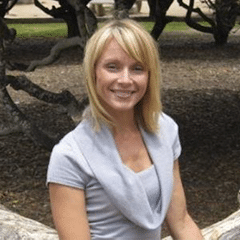
PhD, Licensed Clinical Psychologist
Supporting your partner through addiction starts with communication. As a solution-focused psychologist, I like to find tangible ways to improve the functionality of those who are seeking a measurable behavior change. One helpful tool to improve addictive behaviors, and improve overall life skills is to focus on a positive solution, an alternative means to gain the sought-out outcome- usually one of feeling safe, secure and valued. In many, if not the majority, of those who struggle with substance abuse and addiction, the core component is twofold. First, communication about one’s wants, needs and values are rarely communicated in an assertive nature, leaving one feeling unheard, unimportant and of little value. This lack of assertiveness, thus, fosters a passive or aggressive communication style, further alienating one from connectedness and a secure sense of belonging. Second, these prolonged, habitual beliefs of being undervalued, unwanted or unsafe in a relationship, may influence avoidant behaviors. Avoiding such feelings, beliefs or “unsafe” interactions is then often mitigated by substance use; with time and continued practice of these unhealthy behaviors substance abuse becomes the behavioral outcome. If then, this scenario fits, it is imperative to address assertiveness and communication styles within any given relationship where substance abuse has taken hold. Learning assertiveness tools, for both partners, will enable healthy communication where both voices are heard and valued while healing and building a safe relationship environment.

Cheryl Dale
Psy.D., LMFT
https://drcheryldale.com/
What’s so difficult is how couples can get so polarized where the one addicted has the problem. It’s very easy for the spouse to feel that they are the identified patient in a sense, so it’s very easy to shift the guilt and blame to them and fail to look at our own issues. So I think the first step many times in coming to terms with a spouse when there’s addiction is having to look at ourselves and look at how easy it is to get into black and white thinking i.e. seeing the other person as all bad, everything is about their addiction, we would have more money if he/she wasn’t drinking, etc. And while that addictive process can effect all those different dynamics, it’s not all black and white. Moving to a compassionate place of really understanding that our spouse may have some struggles and that we do too is part of the first step. Surround yourself with healthy friends and family that can help you see clearly so you can mobilize yourself in the best way. This way you don’t become an enabler and are able to see more clearly.
Three points to take note of would be to be compassionate, realizing that you need to look at yourself first and see your own issues and third is to have self care so that you can have the strength to mobilize yourself to do the right thing.
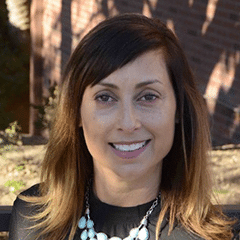
Marriage & Family Therapist, MA, LMFT
What I suggest couples to do to support each other through recovery is to sit down one day a week for an hour (I always suggest Sundays) where there’s no distraction and discuss what you can do for one another for the week. This is for both the addict and the one who is not addicted and needs to do self care. The best way to do this is to look at your schedule and see what each other needs to do i.e. morning time to meditate, therapy sessions, etc. and make it a priority to try and discuss what each other needs for the week.

MPH, MS, LMFT
People often ask “how can I help my partner in their recovery?” It’s common to feel helpless in supporting one’s partner, after all, the decision to maintain sobriety is 100% their choice. As a couples and family therapist specializing in addiction, I can tell you that validating your partner’s emotions is absolutely the most effective means of support you can provide.
What does it mean to validate one’s partner? Simply put, validation is making your partner feel seen and heard. In working with couples, I recommend being intentional about having “LOVE” conversations. LOVE is an acronym for LISTENING to your partner with OPEN mind while VALIDATING (supporting) them and showing EMPATHY. By communicating in this manner, you create emotional safety for your partner. Creating an emotionally safe environment gives your partner the best chance of success in maintaining his or her long term abstinence. Emotional safety is also the strongest predictor of the success of your relationship.
Learning how to have LOVE conversations takes practice; however, everyone is capable of developing positive communication skills. By listening to your partner and responding in a compassionate and supportive way, you help raise your partner’s self-esteem. This is tremendously important since feeling good about oneself is key to staying sober. Therefore, don’t underestimate your role. You can play a huge part in empowering and inspiring your partner to achieve recovery by consistently making an effort to validate their feelings.
